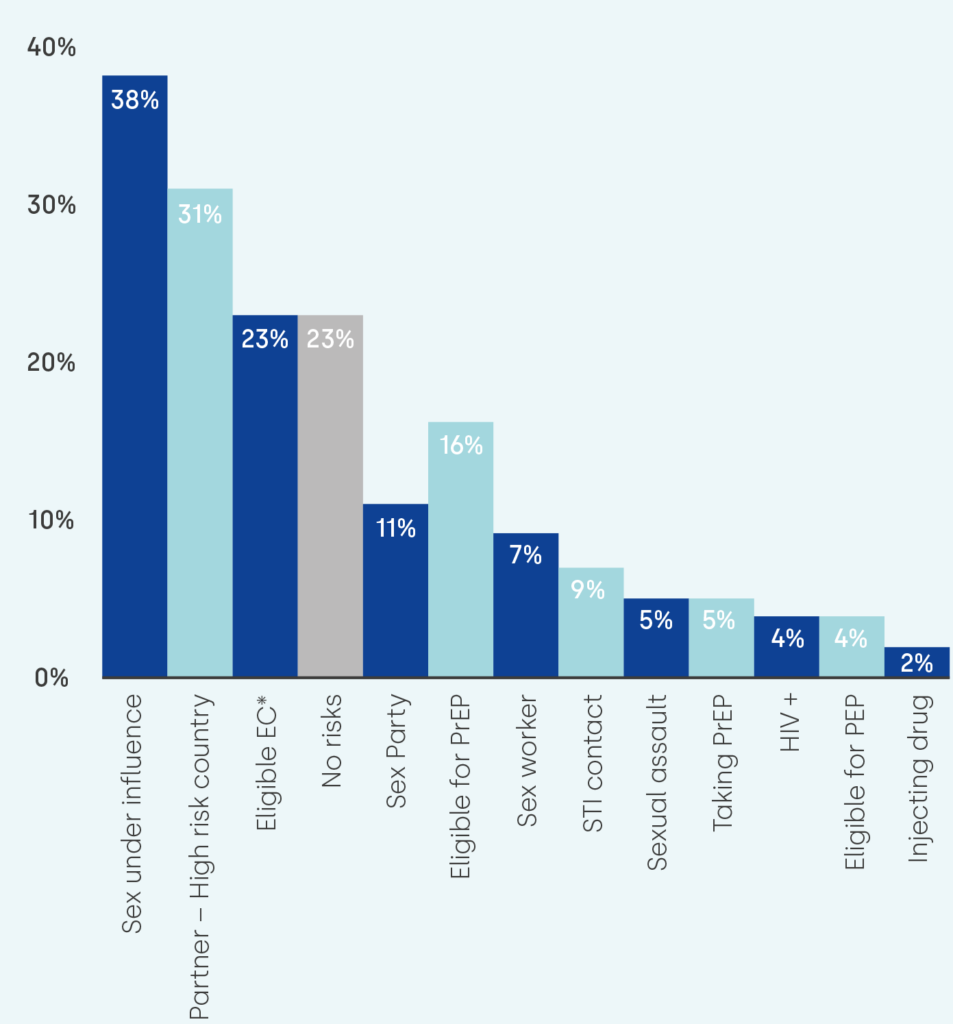by Kate Ebbutt
81%
Reporting coercive control
26%
had never visited a clinic
50%
Received counselling/signposting
Dr M Dickinson (Chelsea & Westminster Hospitals NHS Foundation Trust), C Kellett (Preventx), Dr S Day S Foundation Trust)
Background
Domestic abuse and domestic violence (DA/DV) rates have escalated over the pandemic. Whilst access to sexual health clinics during this time has been restricted, London’s online STI testing service (Sexual Health London) has expanded. SHL introduced three questions to service users (SU), in August 2021, enquiring about DA/DV and provided supportive online information on its portal. Our aim was to gauge the number of SUs potentially experiencing DA/DV and provide a descriptive analysis of SUs that triggered the DA/DV questions.
Methods
The SHL notes were reviewed of SUs who triggered question(s) about current DA/DV, whilst ordering a kit between 17.8.21-28.2.22. SUs that trigger are automatically signposted to SHLs online support pages. The SHL team don’t directly contact these SUs about DA/DV but if they do so for other reasons (e.g., relaying positive STI results) and if safe and appropriate to do so, the triggers are discussed, support/counselling offered, and a safeguarding assessment conducted.
Results
3846/231460 (1.7%) SUs triggered DA/DV question(s) between 17.8.21-28.2.22. The first 202 SUs’ e-notes were manually reviewed. These were: median age 28yrs (18-73yrs); 66% (134/202) female, 30% (61/202) male and 4% (7/202) trans/non-binary gender. 72% (145/202) were heterosexual and 75% (152/202) were UK born.
264 triggers were selected by 202 SUs: 81% (164/202) reporting coercive control, 27% (55/202) physical/emotional abuse and 22% (45/202) sexual abuse. Ten (5%) SUs triggered all three DA/DV questions, 42 (21%) two questions and 150 (74%) one question.
The kit return rate was 76% (154/202) and STI positivity 4%. 26% (52/202) had never visited a clinic. 77% (156/202) engaged in high-risk activity, were from a vulnerable group or warranted additional interventions. See table.
Telephonic discussion with the SHL team took place in 10% (20/202) of SUs: 50% (10/20) received counselling /signposting of which two (20%) were referred to an independent DA/DV advocate (IDVA), 30% (6/20) stated the abuse was historic and required no further action, 10% (2/20) triggered by mistake, one SU (5%, 1/10) declined support for current abuse and another (5%, 1/10) disengaged.
29% (58/202) of SUs revisited the service to order further e-kit(s). Of these, 38% (22/58) continued to trigger the DA/DV questions: 5/22 triggered on different/other DA/DV questions and 9% (5/58) disclosed a sexual assault.

Discussion
1.7% of individuals accessing a pan-London online STI testing service disclosed potential DA/DV. A significant proportion of these users do not access sexual health clinics. After attempted contact by SHLs clinical team an opportunistic DA/DV discussion was accepted by 80% SUs. Despite providing online support, 38% of SUs that revisited SHL continued to disclose abuse with a quarter reporting escalating abuse. Further work is required to explore and evaluate safe and effective methods of engaging and supporting survivors of abuse who access online services. Given the acceptability of telephonic support in this study further investment to resource appropriately skilled staff to be able to offer more interactive support to all survivors of abuse is needed. Harnessing the expertise of London IDVAs to collaboratively support the online STI testing service would be welcomed.



Book a demonstration of our tech platform
About the author:
Kate Ebbutt is the Head of Marketing and Communications for Preventx